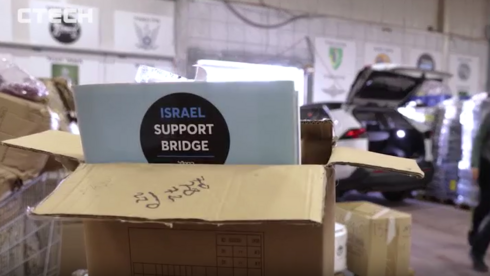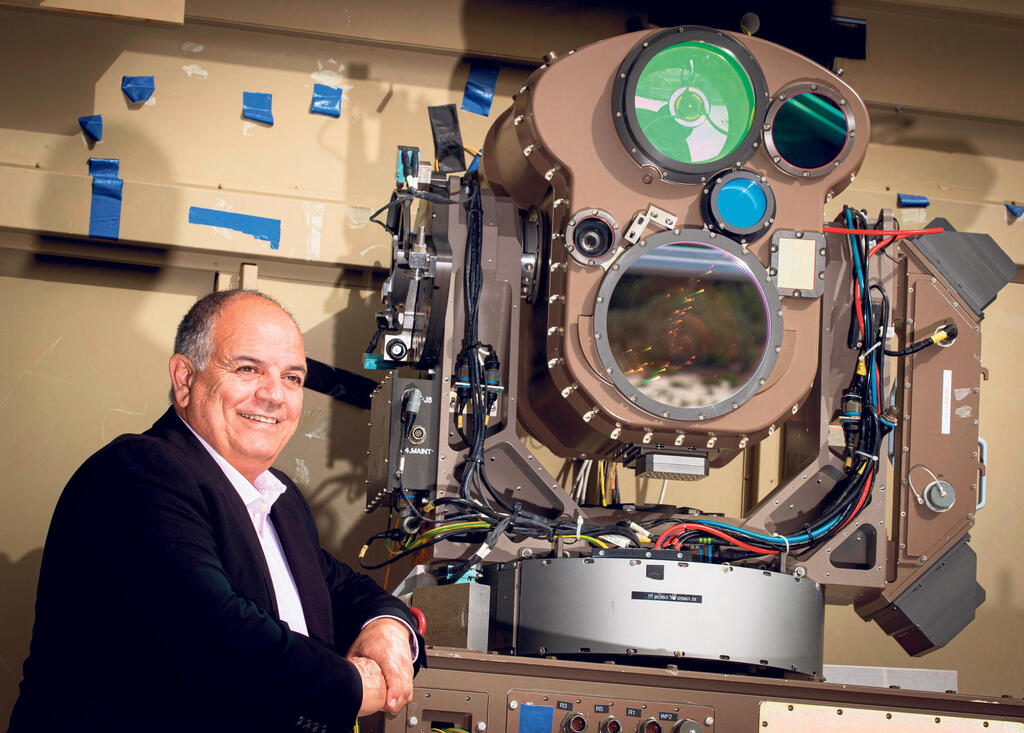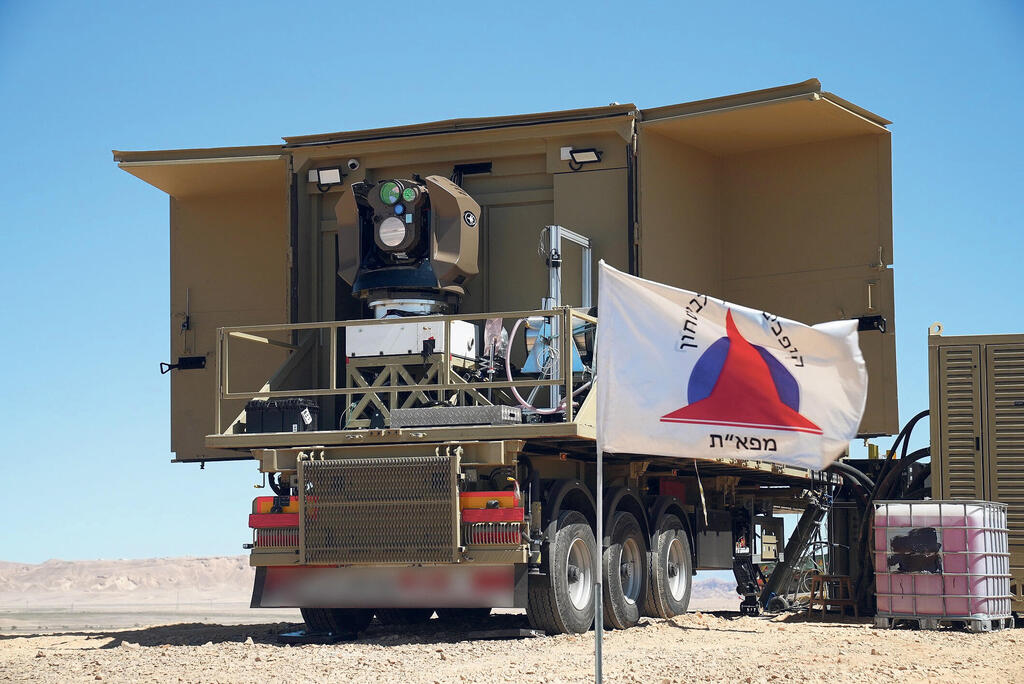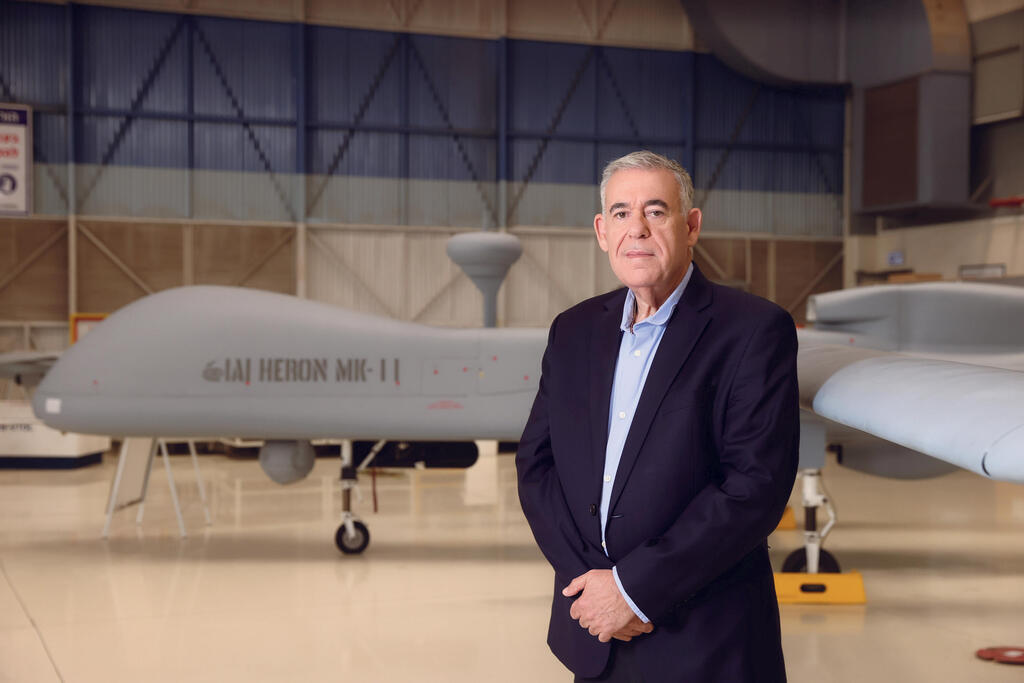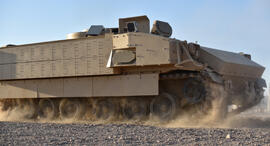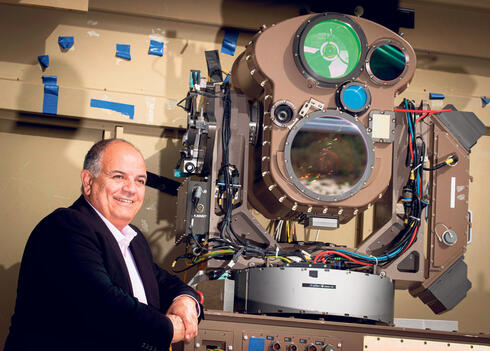
“It’s not science fiction anymore”: Rafael prepares to deploy Iron Beam
Rafael CEO Yoav Turgeman is confident that the laser-based defense system, which the company has developed and will supply to the Air Force by the end of the year, will revolutionize the speed and cost of interception.
"More than 30,000 rockets, missiles, and other projectiles have been fired at us in this war. That’s a lot. With numbers like that in any country, even the most advanced Western country, there could have been a terrible bloodbath. It’s true that there were victims, and each victim is a world unto themselves—a loss that breaks all of our hearts. However, the number of casualties is orders of magnitude lower than what we would have seen and experienced if it weren't for our defense capabilities. Look at the performance of the IDF's 'Windbreaker' tank defense system and compare it to what happened in the Russia-Ukraine war, where entire convoys of tanks were burned and destroyed. Our soldiers are operating tanks in Gaza, where the threats were no smaller or less serious than those in Ukraine," says Rafael CEO Yoav Turgeman in an interview with Calcalist.
His words do not provide a comprehensive summary of the multi-front war that has been ongoing for a year and a half, nor do they summarize Rafael's role in it. Still, it’s clear that he is satisfied. The massive orders from the Ministry of Defense are filling his production lines, particularly for Iron Dome and David’s Sling missiles, which have been operating around the clock since the war broke out. These orders are boosting Rafael’s revenue, bringing its financials closer to those of its competitors, Elbit Systems and Israel Aerospace Industries (IAI), which until recently were perceived to be much larger than Rafael."
Even after a record-breaking sales year in 2024, Turgeman sees no end in sight to the incoming orders for the next two years. He emphasizes that the company’s journey is far from over. In the coming months, Rafael will deliver the innovative 'Magen Or' (Iron Beam) defense systems to the Air Force. This system, based on powerful lasers, will usher the IDF into the era of energy weapons. If all goes as planned, it will cause a real revolution in the interception of rockets, UAVs, and other flying objects.
When will this happen?
"By the end of the year. I sincerely hope it will happen well before then. We are in very advanced stages with this project. The hardware is already in our hands, and we’re about to bring groundbreaking news to Israel and the world. We must remember that we are pioneers in the field of laser weapons, and we are working to perfect this system, ensuring it works in the best way possible. Our goal is for the first experience with it to be outstanding."
"Significant military and psychological effect"
The practical significance of this technological breakthrough, which Rafael engineers are finalizing for operational use in the IDF, is a dramatic reduction in the cost of intercepting rockets. According to Turgeman, "We will be able to intercept many threats at electricity rates, with costs possibly as low as 2-3 shekels (less than a dollar) per interception. This has a significant military impact and also a major psychological effect."
How so?
"In the past, the enemy understood that they could challenge the Israeli economy through large rocket barrages and by harassing civilians. Iron Beam will lower interception costs, and the ability to neutralize threats at the speed of light will allow us to eliminate them at a very early stage."
Still, there are objective factors that could make laser interception difficult, such as cloudiness, haze, and various airborne substances. Should we be in a hurry to dismantle bomb shelters?
"We have solved many of the issues you’ve mentioned. We will be able to operate Iron Beam even in challenging weather conditions. It will be integrated into the Iron Dome battery system, and this combination ensures we have full interception capabilities, using either missiles or lasers. Thanks to advanced technology, we can focus laser energy into a spot just a few millimeters wide, targeting objects as far as ten kilometers away, even if they are moving quickly and maneuvering. In the past, this would have seemed like science fiction. Today, we can do it precisely, thanks to sophisticated algorithms and optics. It’s no small feat. Try spotting a point ten kilometers away; it's barely visible."
Despite these capabilities, over the past year, we’ve faced issues with less advanced UAVs that have caused significant trouble.
"We intercepted them in large numbers and ultimately their impact on the battlefield was limited. No system provides 100% protection. I agree with you that these ‘noisemakers’ that fly around and trigger alarms across large areas have a psychological impact. I believe the defense establishment has made tremendous strides in detecting, identifying, and intercepting these threats. I’m confident that the laser system will also play a major role in this area."
But drones have been a known threat long before this war. We knew about Iran’s activities in this field for years, and saw its proxies making extensive use of them. It seems we were caught off guard, treating these drones as mere ‘noisemakers.’
"Developing a laser system isn’t a task that can be completed in an hour, a day, or even a year and a half. Rafael has been developing the capabilities that Iron Beam will bring to the table, alongside the defense establishment, for many years. This shows that we weren’t ignoring the threat. In the meantime, our other systems have provided a response to this threat—about 95% of them have been intercepted. When you look at the big picture, Israel’s air defense capabilities are almost unimaginable and of a scale that surpasses anything we’ve seen."
What have you learned from this war?
"The learning process is continuous. In the past, hardware-based systems were developed, finished, and used for years without much change. Today, systems are dynamic and constantly evolving because the enemy also adapts and changes. We’ve taken on the task of learning from the enemy and providing solutions before they can even challenge us. I hope we are nearing the end of this war, and I believe we’ve done better than the enemy in terms of learning from their tactics. I do not underestimate their capabilities, and I try to anticipate what they might develop in the future to prepare countermeasures in advance, ensuring we maintain our relative advantage."
The discourse on the IDF’s force-building following the war includes calls for the creation of a missile force capable of delivering a large mass of precise fire in a short time. Where does Rafael fit into this?
"I believe in missile technology. A missile is a very effective tool for achieving military goals, and the IDF is one of the world’s leading armies in this area. How these capabilities are structured—whether as a dedicated missile force or integrated into the air, sea, and land arms—is a question for the army. Rafael has extensive expertise in this area and will be able to provide the IDF with the solutions it needs."
"The national interest must not be pushed aside"
Turgeman began managing Rafael last February, four months into the October 7 war. He replaced Maj. Gen. (res.) Yoav Har-Even, who had led the company for eight years. Torgeman moved from Israel Aerospace Industries (IAI), where he had held several positions, the most recent being CEO of the subsidiary Elta Systems, which focuses on radar systems development and production. This transition raised eyebrows at IAI, with concerns that Turgeman might bring its most closely guarded secrets to Rafael.
Do you understand this concern?
"First of all, it's very flattering. I didn’t think of myself as someone who knew so much."
Still, as a CEO of a subsidiary and a member of the IAI management team, you were exposed to its most sensitive strategic plans. This is no small matter.
"So you see, Elta and Rafael mainly complement each other (the radars used in the Iron Dome system are manufactured by Elta), and they don’t compete against each other. Whoever raised such concerns either doesn’t understand the situation or misunderstood and was deliberately misleading. Additionally, both Elta and Rafael are government-owned, so there is no conflict of interest. It’s like a transfer from one division to another within the Bank Leumi group, and in our case, I work within the State of Israel group. So in my opinion, there is no conflict of interest here."
And yet, you signed a conflict of interest agreement.
"To be clear, I signed a very detailed conflict of interest agreement, so no one would be stressed. I know almost all of IAI’s missile systems. I was personally involved in the development of many of them, and I keep its secrets as promised. You won’t see a case where Rafael develops a new radar or missile to compete with Arrow missiles. I suggest we all focus on defeating the enemy, not inventing unnecessary rivals for ourselves."
When asked if he informed IAI CEO Boaz Levy about his decision to take on the management of Rafael, Turgeman gets angry. "I don’t understand this question, and I don’t want to answer it." He refuses to elaborate on or testify about his relationship with Levy, which has been characterized by tensions and disagreements, especially in recent years. "Everyone has their own worldview. There were not always agreements, and there were not always disagreements. It’s a fact that we worked together for several years. But the nature of my relationship with Boaz Levy is not something the public should be concerned with. We, as CEOs of defense industries, have a good working relationship, and as far as I’m concerned, national interest must come before anything else," says Turgeman.
National interest is important, but we’re all human too, right?
"That's right. Look, I really like the employees at Rafael, but among the 10,000 employees, some I like more than others, and that’s fine. It’s the same in any establishment—there are people I like more and people I like less. But we are all in the same boat. We’ve learned that our enemy is serious, not just in a symbolic sense. If they could, they’d hang us all. We must not push aside the national interest, and if there are personal scores, we must know how to rise above them. I think we, as managers of large industries, do this very well."
After Rafael's 27% sales growth last year it is approaching the numbers of IAI and Elbit. Is becoming one of the two largest defense companies in Israel a goal for you?
"No. I’m not competing with them, not on size, anyway. Rafael’s mission has always been to be a significant pillar in the country’s security—that’s our number one goal, and we’re meeting it. We’re only getting stronger. In the last two years, our growth rate has outpaced that of IAI and Elbit, and I believe this will continue. However, I want Rafael to remain a leading, profitable, and innovative company that contributes important capabilities. If we become bigger along the way, that's great."
Is there anything that could threaten this vision?
"This growth rate isn’t sustainable forever. Companies don’t grow at this pace indefinitely, and to maintain it, we have to invest a lot of effort and avoid making mistakes."
We probably also need wars to fuel the demand for weapons.
"Our growth rate is much higher than the global demand growth rate. This means our share of the global market is growing, and I want to keep it that way. But the global market isn’t waiting for us—other countries are competing, there are alliances, and it's a very complex environment. I hope we can continue succeeding in navigating this stormy sea."
Rafael employs about 10,000 people. Elbit employs twice as many, and you have already topped the order backlog Elbit presented about a year ago. Do you consider Rafael’s employees to be more efficient than those at Elbit?
"I don’t want to say that, but I can say they’re much more creative."
Against the backdrop of the madness and trolling flooding the public agenda, the affair of the appointment of Maj. Gen. (res.) Eli Sharvit as head of the Shin Bet already seems like distant history—though it was less than two weeks ago. Sharvit, a former Navy commander, had served for the past two years as president of DSIT, a Rafael subsidiary that develops systems for protecting marine infrastructure such as gas rigs and ports. Just a few hours after the senior appointment was announced, the Prime Minister’s Office withdrew it due to political resentment over Sharvit’s past participation in a demonstration against the judicial reform.
DSIT, led by Sharvit, is one of about 40 subsidiaries that Rafael owns in Israel and around the world. Turgeman believes that this list will continue to grow, as there is still plenty of money, even after the state receives a dividend of half of the net profit. A few weeks ago, the Government Companies Authority reached an agreement with Rafael's managers to withdraw a NIS 444 million dividend on profits from recent years. For the 2024 profits, which amounted to NIS 950 million, Rafael is set to transfer a higher amount, NIS 475 million, to the state, in accordance with the decision of the board of directors, which will meet and discuss this soon.
Apart from the dividends to the state, which Rafael is obligated to transfer as a government company, what do you do with all this money?
"We buy scientific equipment to enable future developments, build facilities for our engineers and scientists, and acquire companies to improve our access to global markets. Our goal is to continue acquiring companies worldwide, as this is part of Rafael’s expected and strategic business activity."
Mergers and acquisitions are critical for modern companies. Do you have a company in mind here in Israel?
"Right now, there is nothing on the agenda, but if, from a business or technological perspective, we need to pursue one, we will definitely work toward it. In general, when you look at the world, you can learn that most acquisitions are not successful and often fail to meet expectations. Companies tend to buy businesses that are in their field of activity, only to later discover that these activities are actually competing with them. They realize they’re stepping on the same platform. Thankfully, at Rafael, the subsidiaries are flourishing in an extraordinary way in terms of business volume, profits, and technologies."
One of Rafael's subsidiaries, Aeronautics, is the subject of a report by the Government Companies Authority following a series of alleged deficiencies in its acquisition process as part of a previous partnership with Avichai Stolero. What did you learn from this report?
"This is a draft report that we studied, and by the way, we corrected what needed to be corrected on the fly. The acquisition of Aeronautics was a strategic move of enormous importance, not only to Rafael but to the entire country. There is no equivalent in the world to the systems and performance that emerged from this combination. The contribution of this deal is enormous. However, there was a glitch in the acquisition process, which stemmed mainly from a misunderstanding or insufficient orientation on the part of various parties, and the Companies Authority's draft report addresses it. We went through a complete process with the company’s board of directors and the Companies Authority, coordinating a mechanism that will ensure that things are clearer and more unambiguous in the future. This process has almost been fully completed. Mergers and acquisitions are critical for the life of a modern company."
Among the defense companies in Israel, Rafael was previously interested in acquiring Plasan, a manufacturer of protective components for military vehicles from Kibbutz Sasa, and IMI. Negotiations with Plasan were unsuccessful, and it was recently revealed that it intends to go public, while IMI was purchased from the state by Elbit in 2018. "IMI was an excellent company, but circumstances led to an unsustainable economic situation. The state decided to sell it to Elbit and did not allow Rafael to acquire it. I think if we had joined this deal, we would have done an even better job than Elbit," says Turgeman.
Did this acquisition change the competitive landscape among defense companies in Israel?
"Elbit received a very important asset and entered areas where it was not active before, but I have no criticism of the decision made, and I understand the country’s reasoning for selling IMI to them. However, Elbit entered areas like missiles, shells, and rockets, in which it had not operated previously."
As well as defense systems for tanks and other armored vehicles, Elbit is also developing the Spurred Arrow (Chetz Durban in Hebrew), which competes with one of Rafael's flagship systems, the Windbreaker.
"Many great minds worldwide have tried to develop a system similar to the Windbreaker, but so far, it remains the only operational system for over 14 years. It’s not easy to create a solution that works in a real war, in a crowded environment with numerous disturbances. It’s a huge challenge. I wish them luck with this, but in the meantime, many of the capabilities they were supposed to provide haven’t exactly arrived. You probably know that, and you’re asking tough questions. I’m asking difficult questions too. My son was there."
Are you trying to say something?
"I don’t want to get into that."
In general, what do you think about the competition between defense companies?
"It’s very healthy. Even if I didn’t have such competition, I would create it internally. It sharpens minds, improves response times, and makes people act more effectively."
It seems to mainly benefit the Ministry of Defense, lowering prices for them.
"Of course, and the Ministry of Defense has an interest in lowering prices and improving the responses it receives from the companies."
In the past, there were discussions about a merger between Rafael and IAI. They said that both are government companies, operate in the same field, and instead of competing, they could collaborate against the public Elbit. What do you think about that?
"Both IAI and Rafael are very good companies, but they mainly focus on different things, although there are also overlapping activities, as with Elbit. On the other hand, competition sharpens the senses and ensures a good range of available solutions. I think there is a dilemma here that should be discussed, but on the other hand, such a move has not been deemed worthwhile. Over time, the decision not to merge the companies has proven to be the right one. I estimate that this will remain the position of those who believe in this issue in the future as well."
"Suppliers refused to produce various components for us"
The unprecedented pressures on weapons production at Rafael’s factories, most of which are located in the north and often targeted by Hezbollah, which tried to harm them, were just some of the difficulties faced during the situation. Around 20% of its employees were drafted into long-term reserve service at the start of the war, and countries around the world, which imposed an embargo on Israel and other major defense industries due to Israel’s actions in Gaza, refused to supply the raw materials and components needed for production.
"This was expressed in various ways. There were cases where suppliers explicitly told us that they did not want to supply us with various components. There were also cases where I ordered equipment, and when the delivery date arrived, nothing happened. Nothing arrived," recalls Turgeman.
But this is not something that should concern the commander in the field during a war when weapons are needed.
"We managed. Rafael was less affected by this issue because we are used to finding alternatives and substitutes. As a company operating in the global market, we are constantly looking for other suppliers for commercial reasons, and this certainly helped us find ad-hoc solutions during this period, allowing us to continue production. In fact, last year, which was a war year, we produced 60% more. There was also significant activity by the defense establishment to develop independence in local production, and we are playing a major role in this to ensure state independence. Additionally, Rafael is a vertical company, which produces a large portion of its raw materials itself, and this helped us."
How sustainable is this in the long term?
"Right now, it’s being implemented, and the real test will come over the years. The reason why things were not manufactured in Israel previously was primarily due to globalization—the belief that each country would handle what it has a comparative advantage in, and buy what it doesn’t. But globalization has stopped and changed direction, and I believe Israel will have no choice but to ensure that it is independent in most areas."
Israel cannot produce all the weapons it needs and wants. Where do you draw the line?
"It’s not a matter of limits so much as the need for discretion. Ultimately, a country’s resources are limited, and you must make sure to invest them in the right things. There are important and good consultations between the industry and the defense establishment about what to invest in, where to invest, how, and how much. I think this is done well."
"Ties with American industries will continue"
Does the tariff bombshell that U.S. President Donald Trump imposed last week hurt Rafael?
"My understanding is that there should be an exemption for Israeli defense exports to the United States. The tariff order has not yet been formally issued, and we are still studying the issue. We have deep, positive ties with American defense industries, and they benefit both Israel and the United States. I have no doubt that these ties will continue, and our joint work will not be harmed."
Earlier this week, the Innovation Authority revealed a worrying statistic: 8,300 high-tech professionals left Israel since the start of the war. Is this a challenge that concerns you?
"As a citizen of the country, I am very concerned. However, from Rafael’s perspective, I believe we are in a relatively good place, as we have not had any departures in the past two years. We continually assess employee engagement through surveys and questionnaires, and we learn that the engagement is very high. This stems from the employees' sense of mission and identification with the company's values and its role in building Israel's national security, even for the very existence of the state."
Can you point to a single Rafael system whose operational capability in this campaign was lacking in the field?
"I can’t speak about that. However, we are always working on systems that will reach operational maturity in one, two, or three years. Incidentally, due to the war, we expedited development schedules and introduced various systems into operational activity, which expanded the IDF’s capabilities across different theaters, even though, according to the original plans, they were supposed to be delivered much later."
How do you shorten schedules in very complex development programs that are typically time-consuming?
"We changed timelines, worked around the clock, pushed aside bureaucracy, and completed processes that would normally take months in just a few days—all without compromising quality. In these cases, we concentrated our efforts, and it paid off because it saved many lives."
First published: 10:02, 13.04.25








